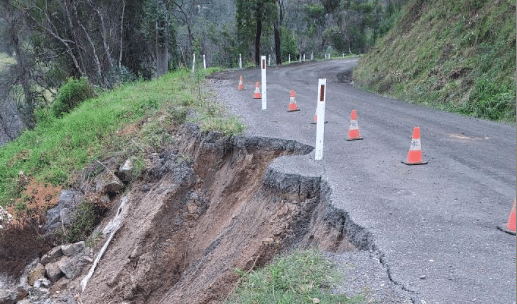Council backs submission to severe weather road inquiry
Council has made a submission to a Federal Government inquiry into the implications of severe weather events on the national, regional, rural and remote road network.

3 April 2023
Bega Valley Shire Council has made a submission to a Federal Government inquiry into the implications of severe weather events on the national, regional, rural and remote road network.
With the Bega Valley local government area experiencing 10 declared natural disasters in the past three years since the Black Summer bushfires, Council’s CEO, Anthony McMahon said he was pleased to see the inquiry return long-term improvements to local roads.
“For the past three years we have witnessed countless scenes of roads across Australia being torn apart by flooding, and many of these have been in our own backyard,” Mr McMahon said.
“Councillors recently agreed to build on a unified message from the Canberra Region Joint Organisation (CRJO) which spelled out the need for proactive investment in roads and bridges rather than repetitively funding repairs.”
“Bega Valley Shire Council was instrumental in working with CRJO members to draft their recently endorsed submission, and now we have referenced this submission with additional key points relevant to our organisation and community.
“Our submission forms part of a long-term strategy aimed at both state and federal governments to highlight the funding needs of councils with a rate base not large enough to fund the extensive road and bridge networks we are expected to manage.
“All road users should have access to a functional and well-maintained road network, and we welcome the Federal Government inquiry that formally investigates the widespread impacts of severe weather events on our roads.
“Our submission makes 16 recommendations to the Australian Government as well as taking a wider look at the role Council roads play in developing more resilient routes to keep traffic moving during flood and fire events.
“The recommendations refer specifically to key Australian Government programs that need additional flexibility and funding support, in particular the Roads to Recovery Program, the Bridge Renewal Program and Natural Disaster Funding Arrangements.
“For example, we are calling for the doubling of the annual Roads to Recovery Program budget to $1 billion across the country, and at the minimum expand funding of the Bridge Renewal Program to $170 million per year.
“Our hope is that a unified voice from Councils around Australia will send a very clear picture that economic development, sustained productivity and the wellbeing of local communities is dependent on a resilient and operational road and bridge network.”
The Bega Valley Shire Council submission calls on the Australian Government to:
• Increase the Australian Government’s Roads to Recovery Program from $500 million to $1billion per annum on-going across Australia from 2023-24.
• Index the annual Roads to Recovery allocations aligned to the construction cost index plus the growth in the road asset base to maintain funding levels in real terms.
• Revise the Roads to Recovery Statement of Intent to include the development of local road resilience plans and the integration of natural disaster adaptation strategies into Council transport, asset management, long term financial plans, delivery programs and annual budgets.
• Allow Councils to utilise Roads to Recovery funding to develop road resilience, road safety and road network management plans on a one-off 50/50 funding basis with a maximum limit of $50,000 per Council (subject to increasing the overall funding).
• De-couple the roads component of the Local Roads and Community Infrastructure Program and extend a new $250 million per annum Community Infrastructure Program 2025-26 onwards.
• As a minimum, double the Australian Government’s Bridge Renewal Program from $85 million per annum to $170 million per annum to target improving the resilience of local road routes (with a priority on replacing timber/hybrid bridges, causeways and other vulnerable structures).
• Work with Local Government NSW and the NSW Government to negotiate the removal of emergency services levy charges from NSW Councils for the NSW Rural Fire Service, State Emergency Services and NSW Fire and Rescue, in return for a commitment from Councils to develop formal road resilience plans and spending the equivalent amount of funds on the resilience of roads for a period of not less than five (5) years.
• Develop new guidelines for the Natural Disaster Funding Arrangements to allow increased flexibility to ‘build back better’ with fast efficient approval mechanisms suited to enabling timely recovery work post-disaster.
• Work with State Governments to ensure improved arrangements are put in place for the provision and on-going care of roads servicing large scale green power projects such as wind and solar farms to reduce the cost shift to Local Government.
• Work with State Governments to reduce red tape and provide additional Government resources to enable faster approvals for road infrastructure construction, maintenance and management, including during disaster recovery works.
• Provide a financial incentive program to assist Local Government to employ, train and develop new Cadet Engineers.
• Work with professional bodies such as the Institute of Public Works Engineering Australasia to rebuild the capacity and skills of public works personnel within and servicing Local Government, with a specific focus on whole of road network planning, road drainage, road pavements and road surfacing.
• Work with universities to increase the focus on whole of road network planning, road drainage, road pavements and road surfacing in future Engineering degree course curriculum.
• Continue to support apprenticeship programs to develop new and existing workers in the operational skills required to build and maintain roads.
• Support on-going research into cost effective resilient road materials and independent product review by specialised bodies such as the National Transport Research Organisation (previously ARRB) with appropriate guidelines and training programs to imbed this into practice.
• Continue to collaborate with State and Local Governments, business and the international community to address longer term climate change.
The CRJO submission also identifies examples of the development of more resilient routes for roads and highlights the critical role some Council roads play in providing a more resilient transport network in parallel to the State highways network. Collaboration across Governments (including across State borders) to develop these alternate routes will accelerate positive outcomes in overall community resilience and help drive economic development and higher productivity outcomes across regional Australia.
The submission also identifies a range of known proven resilience improvement techniques, including:
i) focusing efforts on the sound engineering improvements that will have a major positive benefit, the most important being bridges, stormwater structures and drainage improvement (including maintenance), road pavements and road resurfacing.
ii) ensuring all Councils have appropriate risk management policies and codes of practice in place linked to road hierarchy and available resources, to prioritise defects.
iii) rebuilding the skills and capacity of the existing and future workforce in the fundamentals of road network management, construction and maintenance.
iv) simple modifications to current road standards.
v) proven products with further research required on those being tested or under trial.
vi) wider use of technologies to improve the quality of outcomes.
vii) identification of increasing challenges to resilience (such as the adverse impacts of higher mass and autonomous vehicles, and the adverse impacts of large-scale green power projects on local roads), and development of solutions.
Making an enquiry
All media enquiries and interview requests are coordinated by Council's Communication and Engagement team under the adopted Communications Policy. To view this policy, visit Public Policies and search 'communications'.
To submit a media enquiry or to request an interview:
- email media@begavalley.nsw.gov.au
- call 02 6499 2222
Councillors
Councillors can be contacted directly for enquiries regarding decisions of the elected Council and non-operational matters. Interviews with the Mayor should be arranged through the Communication and Engagement team contact details above.
Receiving information
If you’re a journalist or media organisation that would like to receive media releases and notifications about media opportunities, please email your name, title and contact details to media@begavalley.nsw.gov.au and we will add you to our distribution list.
You can also subscribe to Bega Valley Together and Business News, Council's fortnightly e-newsletters, or follow @begavalleyshirecouncil on Facebook and Instagram.






